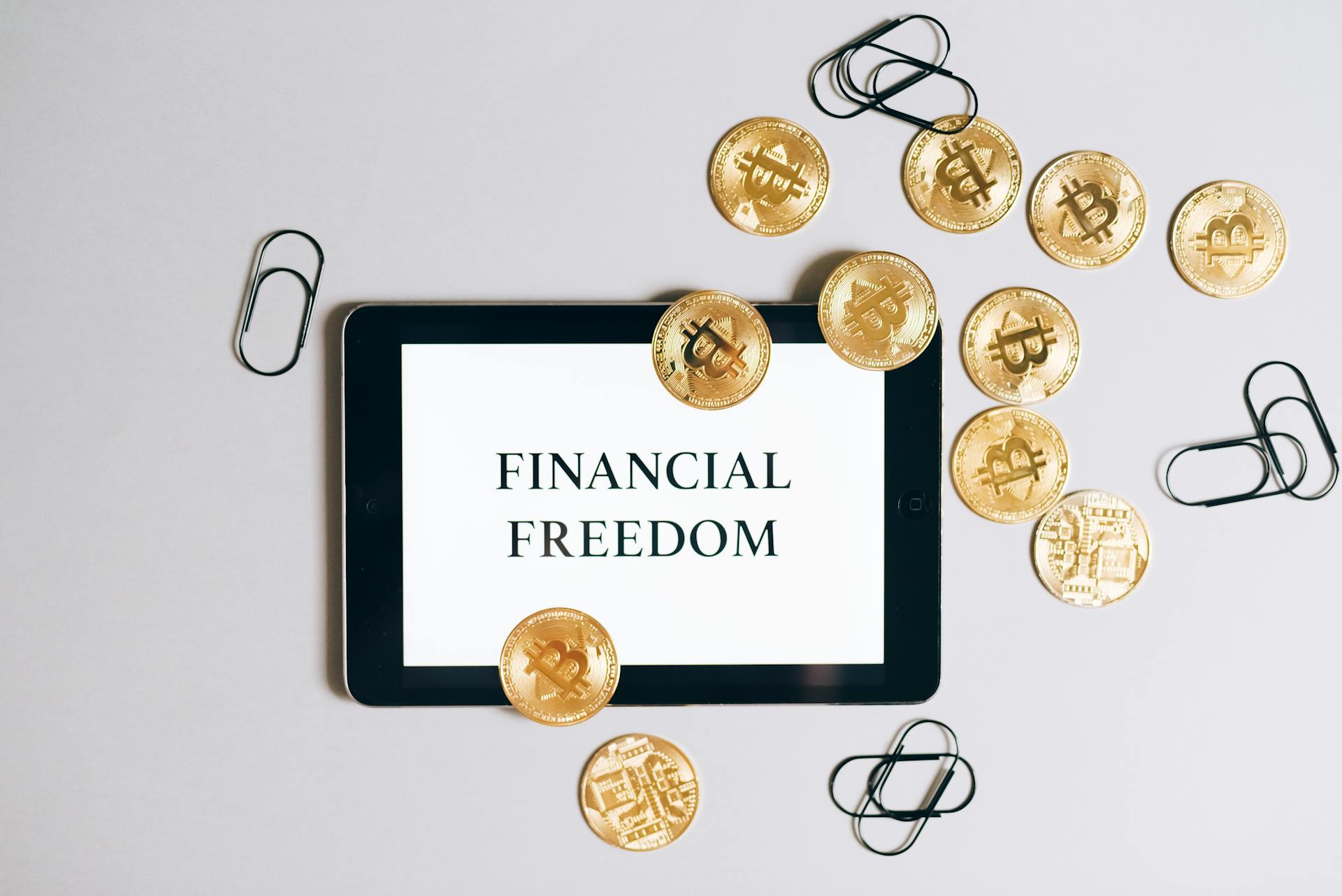
Storing Bitcoins securely is crucial to protect your investment. You can store Bitcoins in a digital wallet, which is a software program that allows you to make and receive payments.
There are several types of digital wallets, including desktop wallets, mobile wallets, and web wallets. Desktop wallets are installed on your computer and offer high security, but they can be vulnerable to hacking if your computer is compromised. Mobile wallets are convenient and easy to use, but they can be vulnerable to theft if your phone is stolen or hacked.
Paper wallets are a physical storage option that stores your Bitcoins on a piece of paper, which is then secured in a safe or a safe deposit box. This option is not recommended for everyday use, but it can be a good backup in case your digital wallet is compromised.
A fresh viewpoint: Is It Safe to Buy Bitcoins
Types of Storage
There are two main categories of storage: custodial and non-custodial.
Custodial wallets involve a third-party managing the private keys, which can be a risk. On the other hand, non-custodial wallets give users full ownership of the keys.
Within these categories, there are four types of wallets: desktop, mobile, hardware, and web-based. Desktop and mobile wallets are not the safest options, as they can be easily compromised.
Hardware wallets, on the other hand, are a secure option, especially if they are not connected to the internet. Web-based wallets are not secure, as you're letting someone else store your keys for you.
Here are the four types of wallets:
- Desktop wallet: A program that resides on your computer. Not the safest storage method.
- Mobile wallet: A program that is hosted on a mobile device. Not very secure.
- Hardware wallet: A device similar to a USB drive. Secure, depending on if it is connected and how it connects to another device.
- Web-based wallet: A wallet that is hosted by a web service. Not secure, as you're letting someone else store your keys for you.
In general, the safest storage method is to use a non-custodial wallet, such as a hardware wallet, and store the bulk of your crypto in cold storage.
Non-Custodial Storage Solutions
You can store your bitcoins in a non-custodial wallet, which is a wallet that you control and manage yourself, without relying on a third-party service.
Non-custodial wallets can be either hot or cold, but the safest option is a cold wallet that's not connected to the internet.
Readers also liked: Cold Wallet Bitcoin
Cold wallets, also known as cold storage, are offline wallets that hold your funds in a secure location, making them less vulnerable to hacking and theft.
You can choose from commercial non-custodial cold wallets, such as the Ledger Nano X or Trezor Model T, which are small devices that connect to your computer and store your bitcoins.
These devices store your private key and come with software that works in parallel to your wallet device or program, allowing you to view and use your holdings without needing to enter your private keys.
Alternatively, you can use a USB drive as a non-custodial cold wallet, as long as you encrypt and safeguard it, disconnect it when not in use, store it in a secure location, make a backup, and only use it in one device for one purpose.
Here are some key differences between commercial and alternative non-custodial cold wallets:
Regardless of the type of non-custodial cold wallet you choose, it's essential to remember that the vulnerabilities of these wallets are the software and connections used on your device or storage media.
To minimize the risk of losing your bitcoins, make sure to record your recovery phrases and keep them in a secure location that only you can access.
Secure Storage
You can safely store your bitcoins by using a non-custodial cold storage wallet, such as a hardware wallet, for long-term storage. This is the most secure option, as it's not connected to the internet.
Cold wallets are also called offline wallets or hardware wallets, and they're not hackable because they're not connected to the internet. Commercial cold wallets, like the Ledger Nano X or Trezor Model T, are a good option, but make sure to disable any wireless connectivity after use.
To store your bitcoins safely, consider using a combination of hot and cold wallets. A hot wallet is convenient for making transactions, but keep only what you plan to use in it, and move your crypto back to cold storage once you're done. This way, you can balance security and usability.
Here are some key takeaways for secure storage:
- Cold storage (or offline wallets) is one of the safest methods for holding bitcoin.
- Only keep what you plan to use in your hot wallet.
- Move your crypto back to cold storage once you're done with your transaction.
Remember to physically record the recovery phrases for your crypto wallets, save them in a secure location, and never share them with anyone. This way, you can recover your crypto if you lose the device itself, and keep your funds safe from hackers and thieves.
Storage Options
Storage options for bitcoins can be categorized into two main types: custodial and non-custodial. Custodial wallets involve a third-party managing the private keys, while non-custodial wallets give users full ownership of the keys.
There are four types of wallets: desktop, mobile, hardware, and web-based. Desktop and mobile wallets are not the safest storage methods, while hardware wallets are secure, but only when connected and used properly. Web-based wallets are not secure, as they rely on a third-party to store your keys.
A cold wallet, also known as cold storage, is a wallet that is not connected to the internet, making it a more secure option. Hardware wallets are a type of cold wallet that can store cryptocurrency offline. Commercial non-custodial cold wallets, such as the Ledger Nano X or Trezor Model T, are also available and can be a safer option than storing your keys in a connected device.
Here are some storage options to consider:
The safest way to store crypto depends on the user and their needs. A blend of hot and cold wallets can create a good balance between security and usability.
Storage Options: Pros, Cons, and Risks
Storing your cryptocurrency in a custodial wallet is the default option, but it's not the most secure. Custodial wallets involve a third-party managing the private keys, which can be a risk.
A non-custodial wallet, also known as a self-custody wallet, gives users full ownership of the keys. This is a more secure option, but it requires more effort from the user.
Hot wallets hold funds online, making them easily accessible, but also vulnerable to hacking. Cold wallets, on the other hand, hold funds offline, providing a higher level of security.
Here are some key differences between hot and cold wallets:
It's worth noting that a cold wallet is not completely hack-proof, but it's a significant improvement over hot wallets. Some cold wallets, like hardware wallets, can store multiple cryptocurrencies and have a recovery phrase to recover funds in case the device is lost or damaged.
Ultimately, the best storage option depends on the user's needs and preferences. A blend of hot and cold wallets can create a good balance between security and usability.
Intriguing read: What Is a Hot Wallet
Multi-Signature
Using a multi-signature setup can add an extra layer of security to your storage options. This involves transaction approval from several people, typically between three to five, before a transaction can take place.
The concept of a multi-signature is also known as a shared wallet. It limits the threat of theft as a single controller or server cannot carry out transactions.
To use a multi-signature setup, you need to decide on the people who can transact with your funds. This is usually done when you first set up the shared wallet.
It's essential to know and trust the other people involved in the multi-signature setup before joining the wallet. This ensures that you're comfortable with the level of access they have to your funds.
Paper
Paper wallets are a type of cold storage that provides an affordable option for securing your cryptocurrency. They're created by printing out public and private keys, usually as both a string of characters and as scannable QR codes.

A paper wallet can be created by following steps online, making it a DIY solution. However, it's worth noting that paper wallets are the least user-friendly cryptocurrency storage option.
Paper wallets have the same advantage as hardware wallets in that they provide greater security by keeping your crypto offline. It's also practically free to make your own, so they're ideal if you want maximum security at the lowest possible cost.
The potential for user error with paper wallets is substantial, which is a major drawback. This is because they require you to manually sweep the private key into a hot wallet to access your funds.
Here are the pros and cons of paper wallets:
- Pros: Provides an affordable cold storage option
- Cons: High risk of user error or wallet damage
Storing a private key on a paper wallet is more secure than storing a seed phrase. This is because a private key grants access to a single address, whereas a seed phrase grants access to the entire wallet.
Suggestion: Private Crypto Wallet
Custodial Storage
Custodial Storage is a popular option for storing Bitcoins, but it's essential to understand the risks involved. A custodial wallet is managed by a third party, such as an exchange like Coinbase, which stores your private keys for you.
This arrangement guarantees the safety of your private keys, and some custodial wallets even offer insurance on holdings up to a certain amount. However, custodial wallets have been the target of many attacks since users began using their services.
If you buy coins from cryptocurrency exchanges, apps, or stockbrokers, they typically put it in a custodial wallet they control. You can transfer your coins to your own hot or cold wallet, but not every crypto platform allows this.
There are advantages to using a custodial wallet, including requiring the least amount of work on your part and making it easy to access your crypto if you want to trade it. However, you're relying on the security measures of the third-party platform and trusting that it won't lock you out of your account.
If this caught your attention, see: Current Amount of Bitcoins

Here are some key points to consider when choosing a custodial wallet:
- Requires the least amount of work on the user's part
- Easy to access if you want to trade it
- You don't need to worry about losing a crypto wallet
However, using a custodial wallet means you're relying on the security measures of the third party and trusting that it won't lock you out of your account.
Backup
Backing up your bitcoin wallet is crucial. You should back up your entire wallet early and often, especially if you're using a computer.
In case of a computer failure, regular backups can be the only way to recover your currency. A history of backups may be your only hope to get your bitcoins back.
To create a backup, include all the wallet.dat files. These files contain your wallet's data and are essential for recovery.
Store the backup at multiple secure locations, such as on a USB, CD, or another removable device. This will ensure your backup is safe even if one location is compromised.
Use a strong password on the backup and encrypt it. This will prevent unauthorized access to your wallet data.
Readers also liked: Bitcoins Back
Security Measures
Storing your bitcoins safely requires careful consideration of several factors. The safest methods are those you manage yourself without a connection to the Internet.
To determine the best security measures for you, ask yourself a few questions. How much have you invested in crypto? If it's a small amount, you might be okay with an exchange wallet that makes it easy to send transactions, even though it's less secure.
The amount of crypto you hold can greatly impact your security needs. If you have a large sum, storing the majority of funds in cold storage on a hardware wallet would be the best option.
You should also consider how often you'll want to spend/send your crypto. The more often you make transactions, the more you may be willing to sacrifice some security in exchange for easier access to a portion of your funds.
A non-custodial wallet of any kind can be just as easy to use while also being more secure, as the keys are entrusted to the user rather than a third-party. This is because security must be balanced with usability, and less technical users may choose to opt for less secure options.
Here are some key security measures to consider:
- Use a hardware wallet for long-term cold storage.
- Consider a mobile self-custody wallet for spending and transacting with crypto.
- Use an exchange wallet for trading niche crypto coins and tokens.
Frequently Asked Questions
Can you lose crypto in a cold wallet?
Yes, you can lose access to your crypto in a cold wallet if you lose the wallet itself or its backup seed phrase. Losing both can result in permanent loss of funds.
What is the safest wallet to store Bitcoin?
For long-term storage, consider using a hardware wallet like Ledger Stax or Trezor Safe 5, which offer robust security features and offline storage. For added security, consider combining a hardware wallet with a secure online wallet like Binance Web3 Wallet or Coinbase Wallet.
Sources
- https://www.eccu.edu/blog/cybersecurity/cryptocurrency-cybersecurity-how-to-store-your-crypto-safely/
- https://www.investopedia.com/news/bitcoin-safe-storage-cold-wallet/
- https://www.fool.com/investing/stock-market/market-sectors/financials/cryptocurrency-stocks/how-to-store-cryptocurrency/
- https://www.bitpay.com/blog/safest-ways-to-store-crypto
- https://medium.com/coinmonks/the-only-safe-way-to-store-crypto-e188bb58afd7
Featured Images: pexels.com


